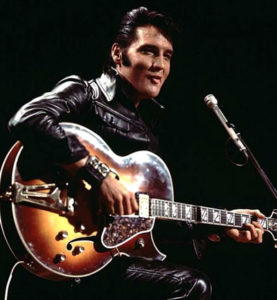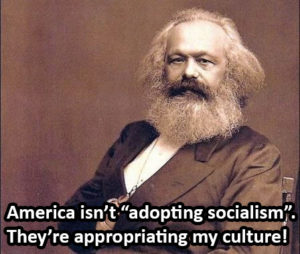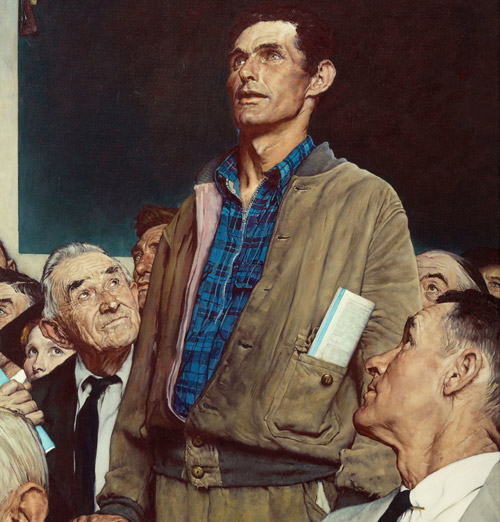"Cultural Appropriation," NOUN
Definition of "Cultural Appropriation"
- A primary feature of human advancement through the process of exploration, observation, and adaptation of elements (styles, views, norms, habits, artistic forms, etc) found in different cultures.
- The act of members of a dominant culture attempting to borrow, appreciate or celebrate a lesser known style, habit or artifact found in another culture.
- The adoption of or identification with an element or elements of a minority culture or identity by members of a dominant culture or identity. Unlike minority cultures that willingly appropriate best practices wherever they find them, controversy may erupt when members of a dominant culture borrow from minority cultures
Examples of "Cultural Appropriation" include:
- Dreadlocks, a hairstyle possibly developed by every primitive culture (certainly used by Vikings who never met Africans), is now the sole possession of Africans and/or Rastafarians. Any attempt by whites to "Sideshow Bob" your hair is considered cultural appropriation.
- Game makers produced a simple, Americanized version of Chinese Mahjong ($450) using images instead of Chinese characters that was called racist and offensive: "They tried to update it, and improve it for Americans." Clearly, if Americans want to play Mahjong, they should learn Chinese and purchase an authentic version from the Ming dynasty.
- "White popstar fascination with Japanese styles, whether Katy Perry's "Unconditionally" dressed as a geisha or Gwen Stefani's “Harajuku Girls” are committing cultural appropriation.
- Michael B. Jordan, star of Black Panther (whose theme involves cultural appropriation) is under fire for launching a rum named after a Trinidadian festival. Since he has no relationship to Trinidad, he apologized and is working on renaming the product.
What Is Cultural Appropriation?
Cultural Appropriation is an umbrella term that manages to represent not only spiteful depictions of other cultures but also benign celebrations of diversity, or any person or company trying to market products resembling something from another culture.
At it’s core, cultural appropriation is one of two primary means of advancing any culture or humanity. Innovation is the other.
In fact, every human of every race commits cultural appropriation beginning at birth. Even outliers like Tarzan and that boy raised by wolves appropriated and adapted to someone’s cultural habits in order to survive, thrive and mature.
Western civilization is preeminent and the United States is the best because of our melting pot appropriation culture. We are unparalleled in our ability to filter every nation’s cultural artifacts to find what’s unique and useful, and to adapt it to our desires. That’s why, as mentioned in our Core Values:
But the USA is hardly unique. Cultural appropriation is the hallmark of civilization itself. While China steals and duplicates most intellectual property, Japan is a master of replicating and developing Western technology.
From the industrial era to today’s digital age, advancements are expedited through businesses appropriating new technologies and modifying them, applying them to different fields, and improving them through customer interactions.
Even war, which leaves devastation in its wake, becomes fertile ground for accelerated advancement as enemy technology is captured, duplicated, and improved within weeks to gain competitive advantage. Consider that at the start of WWI, airplanes were used entirely for scouting and pilots juggled bolt-action rifles in their laps. Less than two years later, they were dogfighting, firing automatic rounds through the propeller rotation.
The Process of Cultural Appropriation
Also called acculturation, appropriation means an inclusive “dominant”culture “colonizes,” the minority “victim” culture. This selection process can be divided into three parts:
Useful
Practical, beneficial features. Quickly assimilated.
Not Useful
Ignored or replaced by dominant culture's feature
Artifacts
Impractical but aesthetically pleasing or curious
Examples of each are not always obvious since culture is like the air you breathe. Consider that a cow in the field is beef in the kitchen. Pig in the field is pork in the kitchen. Why? Colonization: William the Conqueror conquered Britain in 1066 and brought his French chefs into English kitchens.
Most English speakers don’t also speak German or Japanese, but you know useful words like Schadenfreude and sushi. But you can’t think of any Irish or Pict words for anything. Our dominant culture replaced everything but leprechauns, which are artifacts.
Native Americans gave us the teepee and tomahawk, even though we already have “tents” and “axes.” We just liked the words (along with Redskins, Braves, Screaming Eagles, etc). The same cannot be said for any native clothing except the blankets, which are heirlooms and museum pieces; in other words: artifacts.
While most us can agree that imperialism and colonization are horrendous, what is harder to swallow is that cultural assimilation is a vast improvement over separation, or balkanization. History has shown that assimilated minority cultures are more advanced and prosperous than those that did not. Not that technology and wealth are the “end all, be all,” but it is a mitigating consideration.
Consider that African-Americans have better lives than most Africans (who sold them into slavery, FYI), and certainly better lives than the slaves sold to Arab countries. American natives who assimilated are better off than those who stayed on reservations, which were originally established to keep their cultures intact.
And this process is also NOT one-way. Many ethnicities came through Ellis Island seeking a better life in our inclusive culture. They opened authentic Chinese restaurants, or Indian restaurants, or Mexican, Thai, Japanese — you name it — and over time, modified their cuisine to suit the American palate. Some became corporations and devolved into fast food or “fusion” (Tex-Mex, pan-Asian, etc), while others remained authentic.
Yet in today’s culture wars, God forbid any descendant of European ancestry try to open a Mexican restaurant in Los Angeles. That’s somehow a crime against humanity, even if they get it right!
Why? Because while history’s “victims” take for granted the best the dominant culture provides, they will frequently demand undue credit for their culture’s useful features, and complain about others “culturally appropriating” their artifacts.
What they fail to realize is that we ALL benefit from cultural appropriation. An inclusive, diverse culture does what it does: it develops habits, best practices, uses for things. If you can read this, you benefit from acculturation. You have been assimilated. The alternative is not wealth and serenity but obscurity.
To paraphrase Mao: let a thousand flowers bloom.
Here’s another hard truth: culture doesn’t belong to you. Those useful features and artifacts didn’t originate with you, and they continue to have meaning only as they are used and appreciated. The rest is silence.
The Comedy of Hating Cultural Appropriation
All theatrical entertainment from stage to screen are about identification: the audience vicariously experiences a different character’s humanity and struggles through fears and circumstances not their own. That is, audiences identify with the other.
So consider Al Jolson’s “blackface.” His songs were part of a stage performance, and history is now painting him a monster for… mocking? Parody? But wait: Hollywood producers paid a white guy in shoe polish instead of exhibiting actual black minstrel show performers. Why?
It was Al Jolson’s audience. This is the part that’s always missing in the discussion. He was the star and the crowds paid their theater tickets to see him. He was the safe entrance to that vicarious experience. More on that later.

Now consider Ted Danson, Joy Behar, Jimmy Kimmel, Jimmy Fallon, C.Thomas Howell (Soul Man, a movie exploring racial bias), Robert Downey Jr (epic Tropic Thunder portrayal), Billy Crystal (SNL Sammy Davis Jr. impression), Democrat Virginia Gov. Ralph Northam and state Attorney General Mark Herring (reasons unknown) and a host of others who donned blackface under similar conditions… and their “atrocities” are overlooked?
No! Just as Some Like It Hot would not have worked if you replaced Lemon and Curtis for actual women, the performances above “work” because of the juxtaposition! The comedy required it.
You see, while typical standup comedy create distance between the comic and it target of mocking, “humor” creates a communal experience by exploring a facet of our universal humanity. It is typically described as a collision of cultural scripts: two conflicting norms or cultural habits clash to create a new, funny thought that expresses our common flaws and foibles to which everyone can relate, and/or to celebrate the wonders of our diversity (considered a universal virtue for leftists).
So then why was Megan Kelly cancelled for extending that same “collision of scripts” celebration to children dressing up for Halloween?
It has nothing to do with her intentions, which were benign. That is the case of cultural activists being pissy with people they don’t like.
What “cultural appropriation Karens” do is short circuit the process of safely identifying with other cultures through this vicarious collision. It suppresses child’s play, silences performers, and shames the audience for attempting to walk around in another culture’s shoes.
Cultural Appropriation or Appreciation?
 Consider the case of the Utah teenager who wore a Chinese dress to prom. April 22nd 2018, 18-year-old Keziah Daum posed in a qipao (AKA: red cheongsam).
Consider the case of the Utah teenager who wore a Chinese dress to prom. April 22nd 2018, 18-year-old Keziah Daum posed in a qipao (AKA: red cheongsam).
Worn by China’s women since the 1920s, the qipao is worn day-to-day as well as during important occasions. It has evolved into an elegant fashion exemplifing Chinese traditional female beauty, virtues, and confidence, and it has gained popularity in the West as well.
Keziah’s decision to wear one created an uproar but was she mocking Asians?
No! If anything, she wore it to exemplify its values and stand out from her own culture’s traditional conventions. She breathed cross-cultural life into her event (Note: “her choice” is, again, a leftist virtue, except that always means death).
The collision of scripts was a celebration, not a parody (unlike my collision of a leftists and abortion, which is an example of mocking).


And no, her appropriation does not qualify as “stolen valor,” the way imposters dress as former US Navy Seals at Armed Forces celebrations to deceive people and elevate their status.
She brought her status and magnified it though cultural appreciation.
The Fragility of Hating Cultural Appropriation
Interesting note: the cultural activists who hatefully hate (when they’re hating with hateful hatred) cultural appropriation are the same people who claim rebutting “white fragility” is evidence of white fragility.
They claim that “hate” (or “phobia” if you prefer) is evidence of a fragile ego. Well, if the shoe fits, let’s go through some of their hateful excuses of cultural approphobia…
The Stolen Credit Argument
Cultural appropriation is exploitative because it “robs” oppressed groups of the “credit” (and remuneration) they deserve. They cite that many pioneers of rock music died penniless while Elvis Presley and the white musicians who “ripped them off” reaped music industry immortality and $millions.
One variant includes the idea that artist claim to have discovered or invented their appropriation to take all the credit.
So, whether you acknowledge the influence or not, you’re “guilty” of appropriation. Let’s unpack that…
First, WHO is actually being robbed and should be paid? Artists have legal recourse for stolen royalties. Vanilla Ice’s “Ice Ice Baby” stole the baseline from Queen’s “Under Pressure” and the word is that Vanilla Ice resolved the dispute by buying the original song. Now there are sampling clearance houses for the music industry.
Hollywood producers have had to pay off so many stolen script claims that it’s now nearly impossible for budding writers to get their script read.
 But who retains the rights to all the Eastern mysticism borrowed by Led Zeppelin, The Who, The Beatles and other bands in completely original works? Who’s to blame for General Tso’s Chicken (a New York creation, BTW) and all that “Americanized” ethnic foods? Who deserves reparations for all that mild Indian food and sweeter Chinese food? Who is actually harmed or deprived besides the purists who pride themselves on saying “the authentic stuff is better”?
But who retains the rights to all the Eastern mysticism borrowed by Led Zeppelin, The Who, The Beatles and other bands in completely original works? Who’s to blame for General Tso’s Chicken (a New York creation, BTW) and all that “Americanized” ethnic foods? Who deserves reparations for all that mild Indian food and sweeter Chinese food? Who is actually harmed or deprived besides the purists who pride themselves on saying “the authentic stuff is better”?
The answer is, NOBODY. Nobody is harmed, no culture abused, no intellectual property rights trampled. In fact, some yogis and foreign chefs made a living selling their exotic charms in America.
Second, who defines CREDIT. The credit or acclaim “stolen” implies that “oppressed” artists would have (should have) gained widespread acclaim without the appropriation. But that’s not what happened. We know about many disadvantaged artists BECAUSE of white guys like Elvis kicking open doors and mentioning their influences.
Not to sound harsh, but artistic immortality is hard. Most talented originators and innovators of every sphere don’t get famous or make millions. Talent alone doesn’t cut it. For anyone.
 Marketing has value. Hype has value. Popularity is often unfair, even frustrating (like Obama), puzzling (Kardashians) and fleeting (Perfect Strangers). Were those “oppressed” artists hot stuff in their culture? Were they as naturally charismatic and handsome as Elvis? Did they have a SOB of a manager willing to do anything, exploit, cajole, and outright LIE to make their talent a star? Did they have cross-over appeal?
Marketing has value. Hype has value. Popularity is often unfair, even frustrating (like Obama), puzzling (Kardashians) and fleeting (Perfect Strangers). Were those “oppressed” artists hot stuff in their culture? Were they as naturally charismatic and handsome as Elvis? Did they have a SOB of a manager willing to do anything, exploit, cajole, and outright LIE to make their talent a star? Did they have cross-over appeal?
Typically, the answer is no. Cross-over acts rarely happen from country to pop, let alone hip-hop or R&B or world music or jazz or blue grass into the mainstream. In almost all cases, you need an insider, a Moses-like character in a sequin suit to march that nurtured artifact from the wilderness into the limelight.
You can’t cry “stolen credit” since talent and innovation are only part of that star calculus.
More than likely, these cries come from wannabes unable to leverage their own culture into stardom so they attack “the other.” Problem is, they also have no standing to represent their whole culture against progress.
Another variation on this argument claims “Privileged People Profit from Oppressed People’s Labor” – I haven’t seen examples. If we’re talking about some Zorro movie where bad guys force peasants to work in the mines and then blow up the mines with the peasants trapped inside after absconding with all the gold? Yeah, that’s whack, dude. Send in Zorro.
More likely, that “victim” was paid hourly for skilled work, but the resulting product gave massive dividends to the entrepreneurs who risked their own capital, paid said victim among other fixed costs, bought their own marketing, and scrambled with no wage for years until it finally paid off. If that’s what happened, yes. So be it. Let the victim play entrepreneur next time.
It Perpetuates Negative Stereotypes Argument
Certain “oppressed groups” continually face a negative perception by a dominant group that uses their stereotype as a kind of ritualized cudgel.
Consider Katy Perry performing “Unconditionally” dressed as a geisha for the 2013 American Music Awards. Katy paid homage to Asian culture, but some Asian Americans called it “yellowface” — perpetuating a stereotype of passive Asian women.
Personally, I think it’s a bad example. The performance was beautiful and certainly not passive, but the song also didn’t quite fit. There is no juxtaposition of geisha to anything besides the spectacle. She could have used any other motif in its place: film noir, Chinese opera, Belgian chocolates — doesn’t matter. Her official video looks like Tolstoy. It least she attempted something different for the live performance.
A worse (perhaps THE WORST) example: Mickey Rooney in Breakfast at Tiffany’s. You want “yellow-face”? THIS was it! Rooney played Mr. Yunioshi for slapstick comedy in a romcom that didn’t need it. While we might compare its subplot to Dogberry from Much Ado About Nothing, this one really does setup a Japanese man for mockery.
If that performance didn’t perpetuate a negative stereotype, it created one.
In fact, this example proves my point: calling this cultural appropriation is shaking the wrong end of the stick. This was a negative stereotype, a caricature, or mockery, but NOT cultural appropriation. It’s cultural parody.
What’s the difference? Racists and xenophobes prejudge based on origins. They use parody, the comic collision of cultural scripts designed to mock the outsider and “perpetuate negative stereotypes.”
But appropriators (especially artists) explore the world and bring into their work fascinating artifacts wherever they’re found.
These two groups are in most cases mutually exclusive. Conflating both under a banner of “cultural appropriation” is unfairly reductive.
What’s worse, in many cases, you’re blaming the cure for the disease. The more cultural appropriation/appreciation, the more likely audiences will come to see the humanity, the universality through that cultural expression.
I’ve seen two variations on this argument, that cultural appropriation:
- Allows People to express love for the culture while still hating the people. Not exactly sure how that works, but yes, people are allowed to love cultural artifacts without loving the people who created it. Edison was a jerk but he gave us movies and light bulbs. Why start a revolution?
- Makes it’s ‘Cool’ for White People – But ‘Too Ethnic’ for others. This one’s clever. So Katy Perry can do geisha but actual geisha can’t play the AMA show. Okay, yes, I can see that. But you can't dictate the tastes of the mainstream audience. You can only present and hope it plays. The audience tuned in the AMA for Katy entertainment and came away with more than they expected. If the audience wanted cultural enrichment, they would have turned on PBS.
- Spreads Lies About Marginalized Cultures. Again, don't mistake appropriation for cultural parody. More cultural appreciation is the cure, not the disease. In the 1980s, the United States went through a Japanophile craze, from Shogun to ninjas, Sony Walkmans to big screens. It was so ubiquitous, it erased the Breakfast at Tiffany's from the public consciousness. Consider that a sunlight disinfectant.
Trivializing Historical Oppression Argument
- It redefines all simple human interactions as "systems" and "isms" of power and privilege (a cold, dehumanizing, communist worldview that magnifies grievance while minimizing personal responsibility)
- It unfairly presents all majority culture as evil and actively oppressive (another communist principle of perpetual guilt and division designed to fuel a continual revolution, not cultural harmony)
- It unfairly presents all inclusive actions as part of this nefarious plot to rub salt in old wounds even when the approrpriator's intentions are to foster and promote cultural harmony (and, God forbid, make a living)
- It infantilizes minorities under the pretense that time, reason, reconciliation, and opportunity cannot heal wounds
- it presumes an ongoing, generational, hand-me-down hostility for minorities that perpetuates the negative stereotype that they will never fully assimilate (In other words, it validates the separatist and white supremacist worldviews)
While it’s well-meaning to be sensitive to someone else’s feelings — and yes, jerks, bullies, and bad artists abound — eventually this kind of hypersensitivity becomes an insult because it disregards the honor, resilience and will to rise above past adversity that all people of all ethnicities share.
Plus, it disregards any and all progress the majority culture makes to rectify past offenses. Those who claim all appropriation is a vestige of cultural dominance show a vested interest in keeping the past in the present.
There is a time for every season under heaven. So how long do cultures have to wait before it stops looking like trivializing oppression? Consider, only 30 years after the Holocaust, Mel Brooks played “Springtime for Hitler” as a slapstick comedy in The Producers.
Slavery ended 156 years ago. Equal rights, achieved over 50 years ago. (Yes, people still vote for Democrats. We’re working on that.)
But, but, you say, cultural appropriation still:
- Prioritizes the Feelings of Privileged People Over Justice for Marginalized People. No! It prioritizes the present over the past. It prioritizes the innocent individual over presumed group prejudices. It assumes that all participants are seeking amity over enmity. Can you name any other alternative that doesn't further marginalize the minority in a majority culture?
If you want justice, seek justice where it may be found. But don’t seek to punish those trying to cross the divide.
Resolving the Cultural Appropriation Argument
If you’re looking for that one-punch knockout, try: “How are whites supposed to ‘be less white’ without cultural appropriation?”
Or we might say, “Diversity is our strength!” Cultural appropriation is flip-side of that coin. If diversity has any validity at all (that’s another argument), we must believe appropriation makes our culture stronger. Otherwise, you’re just another hypocritical communist.
But that doesn’t really resolve our problem, does it? So we might end where we began: culture doesn’t belong to you. It’s part of the human experience. Our inclusive society means that it will be shared. You can’t Gollum culture since you don’t hold the rights.
Yes, we should be sensitive about cultural parody. Beyond that, the market will decide what’s useful, not useful, or a curious artifact.
Ultimately, Americans of all stripes have only a few choices:
- Assimilation: adopt the dominant cultural norms
- Separation: reject the dominant culture for minority culture (leave or retreat to an ethnic enclave)
- Integration (or biculturalism): compartmentalizing both dominant cultural minority culture
- Marginalization: reject both cultures
I contend that American socialists have chosen marginalization because most minority cultures already know the terrible consequences of socialist policies. That’s the reason they came to America in the first place.
 As such, the activists bemoaning cultural appropriation are NOT seeking harmony or a desire to assimilate, but a long-term strategy to replace American culture with a foreign culture, to replace what works for the vast majority of humanity with what works only for minority elites, or doesn’t work at all. That’s simply a reverse imperialism and colonization.
As such, the activists bemoaning cultural appropriation are NOT seeking harmony or a desire to assimilate, but a long-term strategy to replace American culture with a foreign culture, to replace what works for the vast majority of humanity with what works only for minority elites, or doesn’t work at all. That’s simply a reverse imperialism and colonization.
FYI: That’s not going to happen. At some point, our tolerant, inclusive, dominant culture will have to reject and expel those unwilling to acculturate. We’re already see this conflict throughout Europe, where unchecked immigration and refugee settlements have caused the host more problems than they’re worth.
That’s the big level problem. But for those still shaken by Michael B. Jordan and his Trinidad festival rum, or Gwen Stephani’s “Harajuku Girls” or a host of others trying to create something innovative, different, edgy, whatever… Let them work. Let the process continue. Help them to find that elusive synergy, if you can. Inspire their innovation and celebrate their success. They may just help create a better culture for us all.
Life is hard enough without trolls and malcontents raining on parades.
Stay in Touch
Reducing the impact of leftism, statism, and other negative influences can be difficult. Let’s do it together.
If you have suggestions for resetting our cultural conversation, or just want to be kept up-to-date, send me a question or comment.
Reset Culture
communicate with each other."




